By Timothy Stacey · Sunday, August 14, 2011 The past few days have seen the worst unrest in the UK since the 2001 Bradford Race Riots. Residents have watched from the questionable safety of their homes as mobs of men, women, boys, and girls attack and set light to shops, cars, and buses. Sometimes bystanders and journalists have been attacked too. Many have been shocked by the tendency of some to smash rather than steal expensive goods. The following is a dispassionate look at the facts and possible causes, followed by a controversially hopeful look into what the riots, and the reactions to them, might mean for the future of community in Britain.
Continue reading →
By Timothy Stacey · Tuesday, February 1, 2011 A longer version of this essay was presented at the 2011 Telos Conference, “Rituals of Exchange and States of Exception: Continuity and Crisis in Politics and Economics.”
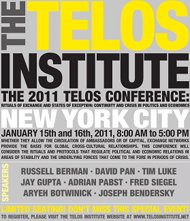 The term “Excellence Critique” connotes a broad array of thinkers, including but not limited to Alisdair MacIntyre, Charles Taylor, Stanley Hauerwas, John Milbank, and Robert Spaemann.[1] While there are clear problems lumping these thinkers together, they share some important qualities. Two such qualities I shall discuss here. The term “Excellence Critique” connotes a broad array of thinkers, including but not limited to Alisdair MacIntyre, Charles Taylor, Stanley Hauerwas, John Milbank, and Robert Spaemann.[1] While there are clear problems lumping these thinkers together, they share some important qualities. Two such qualities I shall discuss here.
First, none of these thinkers deny the successes of liberalism. All agree that liberalism generates the most “wealth” and “freedom” when these terms are measured via monetary success and moral relativism, respectively. Their argument is not one of efficiency; it is one of excellence. Liberalism, according to these thinkers, fails to fully embrace human flourishing. One way of understanding this failure, I will suggest, is via liberalism’s teleological deficit. By teleology I intend a shared, transcendental, and ineffable conception of the good.
Continue reading →
By Timothy Stacey · Tuesday, June 1, 2010 On Tuesdays at the TELOSscope blog, we reach back into the archives and highlight an article whose critical insights continue to illuminate our thinking and challenge our assumptions. Today, Timothy Stacey looks at Peter Schneider’s “Intervention in Kosovo,” from Telos 115 (Spring 1999), and Gábor Rittersporn’s “Humanitarian Intervention?” from Telos 114 (Winter 1999).
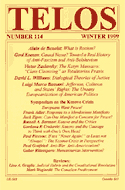 As NATO operations in Iraq whittle down to a bare minimum and debate rages on over the worth of continued involvement in Afghanistan, it is worth reflecting on the arguments surrounding the initial intervention. So some media pundits argue. The problem many had with the intervention in Iraq and continue to have with the intervention in Afghanistan is that they very quickly departed from the initial objectives conveyed to the public, becoming campaigns with no clear mission and no end in sight. Foul play is suspected. The (non)intervention in Kosovo and Rwanda helps to clarify this point. Kosovo was a clear case of humanitarian intervention at its most black and white. The military option was a last resort and when used was proportional. Likewise, Rwanda provides a black-and-white example at the opposite end of the spectrum: clearly military intervention was missed. To summarize: Kosovo and Rwanda clear, Iraq and Afghanistan not so clear. As NATO operations in Iraq whittle down to a bare minimum and debate rages on over the worth of continued involvement in Afghanistan, it is worth reflecting on the arguments surrounding the initial intervention. So some media pundits argue. The problem many had with the intervention in Iraq and continue to have with the intervention in Afghanistan is that they very quickly departed from the initial objectives conveyed to the public, becoming campaigns with no clear mission and no end in sight. Foul play is suspected. The (non)intervention in Kosovo and Rwanda helps to clarify this point. Kosovo was a clear case of humanitarian intervention at its most black and white. The military option was a last resort and when used was proportional. Likewise, Rwanda provides a black-and-white example at the opposite end of the spectrum: clearly military intervention was missed. To summarize: Kosovo and Rwanda clear, Iraq and Afghanistan not so clear.
Continue reading →
By Timothy Stacey · Tuesday, April 27, 2010 Who’s got the X-Factor in UK Politics? A playful look at the debate between John Milbank and Alain de Benoist in Telos 134 (Spring 2006) against the backdrop of the UK general election and other more popular voting shows.
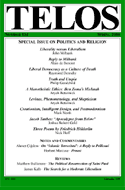 Voting for pleasure is by no means a new phenomenon, but with the advent of TV reality competition shows the trend has seen exponential growth. Consider this alongside a malaise in British voting trends and a general disaffection with politics, and you begin to see why Simon Cowell, reality TV mogul, is testing the water for a reality politics competition show. The premise: if only we could make politics fun, even silly, then people would be more inclined to vote. It seems an obscure jump to make. But disaffection from politics is inversely proportionate to an increase in ratings for entertainment television. In 2005 more people voted for Big Brother than in the UK general election. Nor is the move unprecedented. The dumbing down of British politics is everywhere. Over the last few months, Dermot O’Leary, host of the X-Factor, has been looking to a host a politics show on the run-up to the UK general election. (Can we hope that it is by now too late?) In February, Pierce Morgan, former host of Britain’s Got Talent, held an unprecedented interview with Gordon Brown regarding his personal life. And in 2005 June Sarprong, originally MTV UK host, got much coveted access to Tony Blair. Voting for pleasure is by no means a new phenomenon, but with the advent of TV reality competition shows the trend has seen exponential growth. Consider this alongside a malaise in British voting trends and a general disaffection with politics, and you begin to see why Simon Cowell, reality TV mogul, is testing the water for a reality politics competition show. The premise: if only we could make politics fun, even silly, then people would be more inclined to vote. It seems an obscure jump to make. But disaffection from politics is inversely proportionate to an increase in ratings for entertainment television. In 2005 more people voted for Big Brother than in the UK general election. Nor is the move unprecedented. The dumbing down of British politics is everywhere. Over the last few months, Dermot O’Leary, host of the X-Factor, has been looking to a host a politics show on the run-up to the UK general election. (Can we hope that it is by now too late?) In February, Pierce Morgan, former host of Britain’s Got Talent, held an unprecedented interview with Gordon Brown regarding his personal life. And in 2005 June Sarprong, originally MTV UK host, got much coveted access to Tony Blair.
Continue reading →
By Timothy Stacey · Tuesday, February 9, 2010 Each Tuesday in the TELOSscope blog, we reach back into the archives and highlight an article whose critical insights continue to illuminate our thinking and challenge our assumptions. Today, Timothy Stacey looks at Paul Gottfried’s “Enforcing ‘Human Rights’: Rejoinder to Rick Johnstone” and Alain de Benoist’s “What is Sovereignty?” both from Telos 116 (Summer 1999).
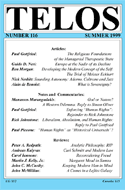 As Tony Blair remains a prime candidate for the EU presidency, despite (or, knowing Blair, in spite of) the protestations of his former adversaries at home, it is high time to pose the question of sovereignty in relation to the central enforcement of human rights. And this for four reasons: first, as Prime Minister of Britain, Blair showed little or no respect for localism, preferring the efficiency of top-down reforms from education to policing. If he cared little for provincial politics as the nation’s leader, what is to say he will care for national politics as the continent’s leader? Second, and as a means to achieving this centrism, Blair flouted parliamentary constraints on his leadership. With the EU checks on central control as lackadaisical as they have proved to be in recent years, all it requires is a maverick like Blair to go trampling through the fine red tape that protects national sovereignty. Third, Blair is an unashamed Europhile, in the past proving quite happy to give up his own nation’s sovereignty in the name of EU global clout. Fourth and finally, Blair is the champion of liberal interventionism. Whatever the discrepancy between his excuse for invading Iraq and his reason for staying it through, it is no secret that heavier on Blair’s conscious is whether Iraq was a ripe case for liberal intervention—not whether he lied to the British people. Before Blair becomes a new-age Charlemagne, it is worth assessing the case of sovereignty with respect to human rights. As Tony Blair remains a prime candidate for the EU presidency, despite (or, knowing Blair, in spite of) the protestations of his former adversaries at home, it is high time to pose the question of sovereignty in relation to the central enforcement of human rights. And this for four reasons: first, as Prime Minister of Britain, Blair showed little or no respect for localism, preferring the efficiency of top-down reforms from education to policing. If he cared little for provincial politics as the nation’s leader, what is to say he will care for national politics as the continent’s leader? Second, and as a means to achieving this centrism, Blair flouted parliamentary constraints on his leadership. With the EU checks on central control as lackadaisical as they have proved to be in recent years, all it requires is a maverick like Blair to go trampling through the fine red tape that protects national sovereignty. Third, Blair is an unashamed Europhile, in the past proving quite happy to give up his own nation’s sovereignty in the name of EU global clout. Fourth and finally, Blair is the champion of liberal interventionism. Whatever the discrepancy between his excuse for invading Iraq and his reason for staying it through, it is no secret that heavier on Blair’s conscious is whether Iraq was a ripe case for liberal intervention—not whether he lied to the British people. Before Blair becomes a new-age Charlemagne, it is worth assessing the case of sovereignty with respect to human rights.
Continue reading →
By Timothy Stacey · Tuesday, January 12, 2010 Each Tuesday in the TELOSscope blog, we reach back into the archives and highlight an article whose critical insights continue to illuminate our thinking and challenge our assumptions. Today, Timothy Stacey looks at Luciano Pellicani’s article “Was Fascism Revolutionary?” from Telos 122 (Winter 2002).
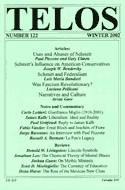 With wave after wave of Islamic extremist attacks across the globe in the last decade, two schools of thought have begun to emerge: the idealist and the realist. The idealist school says that Islam is dangerous; the realist school claims that economic deprivation is the chief cause of terrorism. Both schools are based on the presupposition that liberalism itself has nothing inherently provocative about it. Crucially, both sides ignore that liberalism can of itself be offensive—not because, as some media pundits suggest, its values are hard to swallow, but because it strictly has no values. There is something distinctly inhuman to this aspect of liberalism that is alienating to those that are new to the liberal rationale. With wave after wave of Islamic extremist attacks across the globe in the last decade, two schools of thought have begun to emerge: the idealist and the realist. The idealist school says that Islam is dangerous; the realist school claims that economic deprivation is the chief cause of terrorism. Both schools are based on the presupposition that liberalism itself has nothing inherently provocative about it. Crucially, both sides ignore that liberalism can of itself be offensive—not because, as some media pundits suggest, its values are hard to swallow, but because it strictly has no values. There is something distinctly inhuman to this aspect of liberalism that is alienating to those that are new to the liberal rationale.
Continue reading →
|
|
 The term “Excellence Critique” connotes a broad array of thinkers, including but not limited to Alisdair MacIntyre, Charles Taylor, Stanley Hauerwas, John Milbank, and Robert Spaemann.[1] While there are clear problems lumping these thinkers together, they share some important qualities. Two such qualities I shall discuss here.
The term “Excellence Critique” connotes a broad array of thinkers, including but not limited to Alisdair MacIntyre, Charles Taylor, Stanley Hauerwas, John Milbank, and Robert Spaemann.[1] While there are clear problems lumping these thinkers together, they share some important qualities. Two such qualities I shall discuss here.  As NATO operations in Iraq whittle down to a bare minimum and debate rages on over the worth of continued involvement in Afghanistan, it is worth reflecting on the arguments surrounding the initial intervention. So some media pundits argue. The problem many had with the intervention in Iraq and continue to have with the intervention in Afghanistan is that they very quickly departed from the initial objectives conveyed to the public, becoming campaigns with no clear mission and no end in sight. Foul play is suspected. The (non)intervention in Kosovo and Rwanda helps to clarify this point. Kosovo was a clear case of humanitarian intervention at its most black and white. The military option was a last resort and when used was proportional. Likewise, Rwanda provides a black-and-white example at the opposite end of the spectrum: clearly military intervention was missed. To summarize: Kosovo and Rwanda clear, Iraq and Afghanistan not so clear.
As NATO operations in Iraq whittle down to a bare minimum and debate rages on over the worth of continued involvement in Afghanistan, it is worth reflecting on the arguments surrounding the initial intervention. So some media pundits argue. The problem many had with the intervention in Iraq and continue to have with the intervention in Afghanistan is that they very quickly departed from the initial objectives conveyed to the public, becoming campaigns with no clear mission and no end in sight. Foul play is suspected. The (non)intervention in Kosovo and Rwanda helps to clarify this point. Kosovo was a clear case of humanitarian intervention at its most black and white. The military option was a last resort and when used was proportional. Likewise, Rwanda provides a black-and-white example at the opposite end of the spectrum: clearly military intervention was missed. To summarize: Kosovo and Rwanda clear, Iraq and Afghanistan not so clear.  Voting for pleasure is by no means a new phenomenon, but with the advent of TV reality competition shows the trend has seen exponential growth. Consider this alongside a malaise in British voting trends and a general disaffection with politics, and you begin to see why Simon Cowell, reality TV mogul, is testing the water for a reality politics competition show. The premise: if only we could make politics fun, even silly, then people would be more inclined to vote. It seems an obscure jump to make. But disaffection from politics is inversely proportionate to an increase in ratings for entertainment television. In 2005 more people voted for Big Brother than in the UK general election. Nor is the move unprecedented. The dumbing down of British politics is everywhere. Over the last few months, Dermot O’Leary, host of the X-Factor, has been looking to a host a politics show on the run-up to the UK general election. (Can we hope that it is by now too late?) In February, Pierce Morgan, former host of Britain’s Got Talent, held an unprecedented interview with Gordon Brown regarding his personal life. And in 2005 June Sarprong, originally MTV UK host, got much coveted access to Tony Blair.
Voting for pleasure is by no means a new phenomenon, but with the advent of TV reality competition shows the trend has seen exponential growth. Consider this alongside a malaise in British voting trends and a general disaffection with politics, and you begin to see why Simon Cowell, reality TV mogul, is testing the water for a reality politics competition show. The premise: if only we could make politics fun, even silly, then people would be more inclined to vote. It seems an obscure jump to make. But disaffection from politics is inversely proportionate to an increase in ratings for entertainment television. In 2005 more people voted for Big Brother than in the UK general election. Nor is the move unprecedented. The dumbing down of British politics is everywhere. Over the last few months, Dermot O’Leary, host of the X-Factor, has been looking to a host a politics show on the run-up to the UK general election. (Can we hope that it is by now too late?) In February, Pierce Morgan, former host of Britain’s Got Talent, held an unprecedented interview with Gordon Brown regarding his personal life. And in 2005 June Sarprong, originally MTV UK host, got much coveted access to Tony Blair.  As Tony Blair remains a prime candidate for the EU presidency, despite (or, knowing Blair, in spite of) the protestations of his former adversaries at home, it is high time to pose the question of sovereignty in relation to the central enforcement of human rights. And this for four reasons: first, as Prime Minister of Britain, Blair showed little or no respect for localism, preferring the efficiency of top-down reforms from education to policing. If he cared little for provincial politics as the nation’s leader, what is to say he will care for national politics as the continent’s leader? Second, and as a means to achieving this centrism, Blair flouted parliamentary constraints on his leadership. With the EU checks on central control as lackadaisical as they have proved to be in recent years, all it requires is a maverick like Blair to go trampling through the fine red tape that protects national sovereignty. Third, Blair is an unashamed Europhile, in the past proving quite happy to give up his own nation’s sovereignty in the name of EU global clout. Fourth and finally, Blair is the champion of liberal interventionism. Whatever the discrepancy between his excuse for invading Iraq and his reason for staying it through, it is no secret that heavier on Blair’s conscious is whether Iraq was a ripe case for liberal intervention—not whether he lied to the British people. Before Blair becomes a new-age Charlemagne, it is worth assessing the case of sovereignty with respect to human rights.
As Tony Blair remains a prime candidate for the EU presidency, despite (or, knowing Blair, in spite of) the protestations of his former adversaries at home, it is high time to pose the question of sovereignty in relation to the central enforcement of human rights. And this for four reasons: first, as Prime Minister of Britain, Blair showed little or no respect for localism, preferring the efficiency of top-down reforms from education to policing. If he cared little for provincial politics as the nation’s leader, what is to say he will care for national politics as the continent’s leader? Second, and as a means to achieving this centrism, Blair flouted parliamentary constraints on his leadership. With the EU checks on central control as lackadaisical as they have proved to be in recent years, all it requires is a maverick like Blair to go trampling through the fine red tape that protects national sovereignty. Third, Blair is an unashamed Europhile, in the past proving quite happy to give up his own nation’s sovereignty in the name of EU global clout. Fourth and finally, Blair is the champion of liberal interventionism. Whatever the discrepancy between his excuse for invading Iraq and his reason for staying it through, it is no secret that heavier on Blair’s conscious is whether Iraq was a ripe case for liberal intervention—not whether he lied to the British people. Before Blair becomes a new-age Charlemagne, it is worth assessing the case of sovereignty with respect to human rights.  With wave after wave of Islamic extremist attacks across the globe in the last decade, two schools of thought have begun to emerge: the idealist and the realist. The idealist school says that Islam is dangerous; the realist school claims that economic deprivation is the chief cause of terrorism. Both schools are based on the presupposition that liberalism itself has nothing inherently provocative about it. Crucially, both sides ignore that liberalism can of itself be offensive—not because, as some media pundits suggest, its values are hard to swallow, but because it strictly has no values. There is something distinctly inhuman to this aspect of liberalism that is alienating to those that are new to the liberal rationale.
With wave after wave of Islamic extremist attacks across the globe in the last decade, two schools of thought have begun to emerge: the idealist and the realist. The idealist school says that Islam is dangerous; the realist school claims that economic deprivation is the chief cause of terrorism. Both schools are based on the presupposition that liberalism itself has nothing inherently provocative about it. Crucially, both sides ignore that liberalism can of itself be offensive—not because, as some media pundits suggest, its values are hard to swallow, but because it strictly has no values. There is something distinctly inhuman to this aspect of liberalism that is alienating to those that are new to the liberal rationale. 

